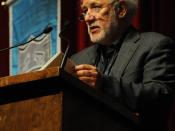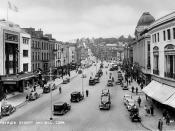When examining a text and its effect, it is important to realise that an audience is composed of multiple individuals, each with their own values and interpretations. In The Skin of a Lion, the novel by Michael Ondaatje is created from a complex range of interwoven storylines, and as a result, can evoke many different interpretations from its readers. These readings are evident among the magnificent web of themes, motifs and characters, spun by Ondaatje.
At one stage in the novel, the main character Patrick is said to have "come across a love story. This is only a love story. He does not wish for plot and all its consequences." One senses that this is actually Ondaatje himself speaking, and that he is voicing the feelings of the reader at this particular stage. The love story intrigues and attracts the audience, who are to become as involved in these relationships as the characters themselves.
The vivid representation is one of entangled passion, romantic obsession and heartache surrounding Patrick, Clara and Alice, as they become involved in the exploration of love, in its many forms. Ondaatje presents the reader with this universal theme and yet still manages to make it seem as though he is introducing us to a new world, one containing lust, sexual passion, and spiritual, friendship and parental love.
The novel is essentially about the working lives of men and women living in Toronto early this century. It details conditions of immigrant labour and contained in the background is the struggle of union movement for fair working conditions. This reading is exemplified when Patrick finds in the library "Everything but information on those who actually built the bridge."
Throughout the novel is a strong fixation on Patrick's tendency to be "a watcher, a corrector." It is ironic...


